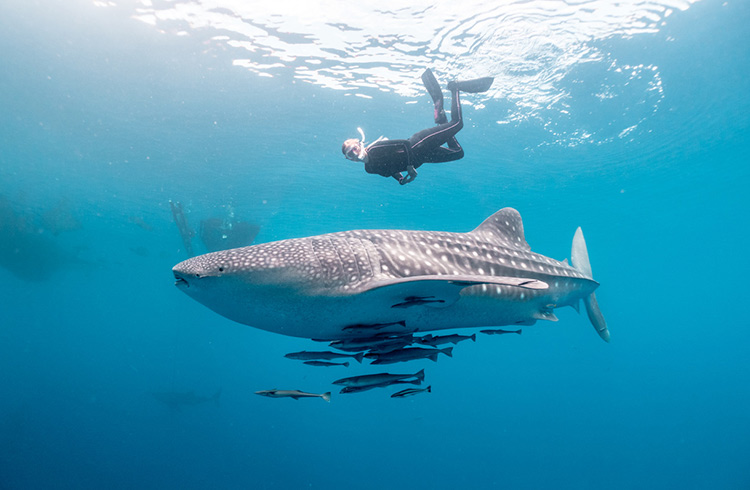Is it Responsible to Scuba Dive and Swim with Sharks?
Controversy surrounds some tourism experiences with sharks, but there are ways to protect these majestic marine animals from harm.
 Photo © Indo Yachts
Photo © Indo Yachts
With more than 500 species of sharks swimming in our oceans, there are endless opportunities for travelers to observe these animals in their natural habitats, whether diving, snorkeling or swimming with them. Before booking your own shark adventure, find out about the ethics of shark experiences, the controversy of shark baiting and cage diving, and what to look for in an operator to ensure the welfare of sharks is a top priority.
- How shark encounters can help their conservation
- Cage diving
- Chumming and baiting
- Swimming and snorkeling with sharks
- How to choose a responsible operator
How shark encounters can help their conservation
Scuba Diving International, a scuba diving training and certification agency, says that for sharks to be protected, “they need to be worth more alive, in the ocean, than dead.” Responsible shark encounters educate people about the value of sharks’ lives and remove the fear of the animals. Shark tourism also generates up to $314 million annually, which can then be used to employ local people to patrol the waters to prevent shark finning.
Nikko Karki of Indo Yachts, a private yacht charter in Indonesia, says shark tourism can be economically practical for fishermen, who can sell shark fins for $50 each – or charge tourists $50 to swim with the same sharks day after day. In Cenderawasih Bay, fishermen make extra money from tourists who gather to see the whale sharks that congregate at their fishing platforms.
Other threats to sharks are illegal fishing and bycatch, which is the accidental capture of non-target marine life that gets caught up in fishing nets. According to the ocean conservation organization, Oceana, longlines – long hooks suspended in the water across several miles – catch sharks instead of the intended target species 20-50 percent of the time. Raising awareness about and increasing compassion for sharks through in-water swimming, snorkeling and diving encounters can motivate travelers to push their governments to prioritize ocean conservation efforts and to crack down on illegal and harmful fishing practices.
Cage diving
Though most sharks are generally safe to be around, great white sharks are the exception. Seasoned divers eager to encounter great whites in their natural habitat may consider cage diving to observe them up close. During a cage dive, participants are locked inside a metal cage and lowered into the water. The practice is also used by conservationists and scientists who are studying sharks. South Africa is known for cage diving with great white sharks, as is Guadalupe Island, 150 miles west of Baja California, Mexico.
In some countries, diving with sharks is a major contributor to tourism. In South Africa, sharks are designated as ‘marine tourism species’, meaning legally controlled tourism activities minimize disturbances and prohibit the animals from being impaired or injured. This does not mean, however, that every single cage diving operation is ethically run. As author and travel writer Andrew Evans points out, businesses naturally strive to earn more profits, so even though shark cage diving operations are mostly well-regulated, big money can speak louder than reason.
Chumming and baiting
Because sharks are naturally timid animals and will rarely approach humans of their own accord, some shark experience tour operators resort to the only trick that will get sharks to overcome their apprehension and willingly approach humans: blood.
Some operators bait sharks by throwing fresh fish and fish scraps into the water, a controversial practice known as ‘chumming’. According to Torben Lonne, chief editor of DIVEIN.com, shark baiting is dangerous because it allows sharks to begin associating humans with food and makes them more aggressive to humans. “If sharks are being routinely fed in a particular area, it's not surprising when they turn up in low water and attack people. They can smell humans from miles away, and if they come close hoping to get fed and there’s no food, they get angry and can attack surfers, divers and other innocent bystanders.”
Instead of baiting sharks, Lonne says responsible operators will track and follow groups of sharks that they know are in the vicinity. He suggests asking tour operators about their practices and reading online reviews to see what previous divers/snorkelers have experienced. One exception, he notes, is cage diving around dangerous sharks, like great whites, but only if the tour operator is using the opportunity to raise awareness about conservation.
Great White Adventures uses a practice called wrangling, where fresh fish is put out as bait to attract great white sharks to the boat, then pulled away before sharks can eat it. The company’s president, Lawrence Growth, has indicated that shark diving and educational programs are the foundation for shark conservation and that bait wrangling is part of the educational experience. To prevent the sharks from running directly into the cages and injuring themselves, his company uses extended side platforms that allow bait wranglers to pull the bait in without enticing the shark directly into the cage.
Is it safe to swim or snorkel with sharks?
You don't need to be a certified scuba diver to enjoy in-water experiences with sharks; opportunities to swim and snorkel with sharks are offered all over the world, and the majority are safe to swim with, including reef, whale, leopard and nurse. Whale sharks can be spotted year-round from Mozambique to Mexico to the Maldives and, as the biggest fish in the sea, it can be a truly spectacular experience to swim with them. These massive animals can reach up to 40 feet in length and each has a unique spot pattern similar to human fingerprints.
Sharks have predictable migration patterns and will be more likely to be spotted in certain parts of the world during a given time of year. No responsible operator should ever guarantee you’ll see a particular animal while in the water and, if they do, they may be chumming/baiting to entice the sharks to swimmers. These operators should be avoided.
How to choose a responsible operator
While choosing a PADI-certified dive operator ensures you will be guided by an accredited dive operator, it does not guarantee that they will enforce responsible diving practices. The World Wildlife Federation has a shark and ray tourism best practice guide. Although it’s not an official accreditation, divers and swimmers can ask operators if they abide by the guide’s recommendations. Using travel platforms that only list sustainable marine experiences, such as diving travel company ZuBlu, will ensure you select an operator that employs best practices.
According to Australian shark biologist, Charlotte Birkmanis, an operator should have a code of conduct visible on their website and on-board, and ensure that all visitors abide by it. “The code of conduct would cover restrictions on interaction time, the number of people in the water, and guidelines for tourists when in the water. Specific guidelines should include no touching or feeding allowed; maintaining a certain distance from the shark; and specifying which direction to approach the shark from.”
Education is the key to responsible shark experiences. If an operator is promoting shark dives as a thrilling form of entertainment (and upselling underwater photos with the sharks) but not offering any information about the animals and conservation efforts, then the operator likely isn’t a responsible operator. Instead, look for operators with a tie to a research organization or NGO to ensure your money is going where it's most needed.
Funding is a constant challenge for marine conservation researchers so Indo Yachts works to get scientists on board privately chartered yachts in Indonesia so that two to three scientists can conduct research during a group or family’s vacation.
Whether you’re swimming, snorkeling or diving, there are loads of opportunities for you to get up close with sharks in a way that’s both fun and responsible. Ready, set, swim!
Related articles
Simple and flexible travel insurance
You can buy at home or while traveling, and claim online from anywhere in the world. With 150+ adventure activities covered and 24/7 emergency assistance.
Get a quote


No Comments